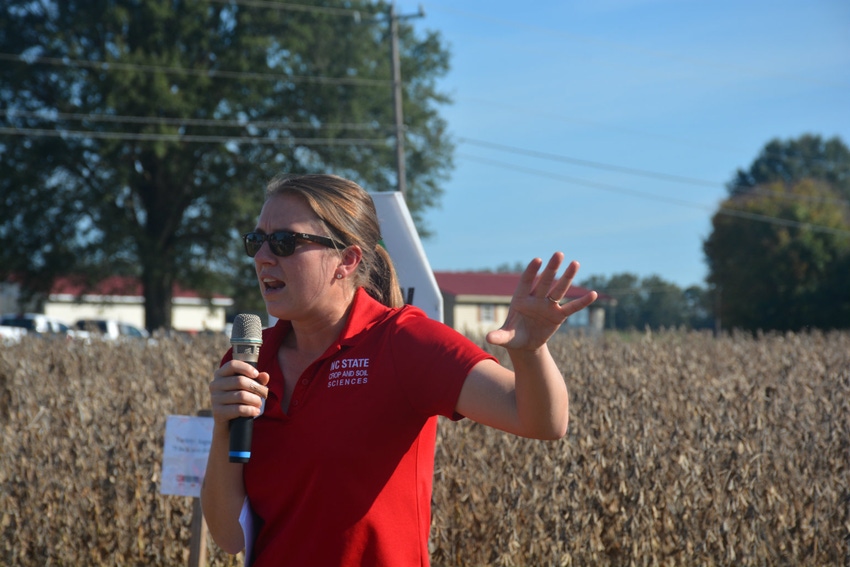
With growers across North Carolina showing more interest in producing earlier-maturing soybean varieties, North Carolina State University is stepping up its research to see how early-maturing Group III and Group IV varieties perform in the Tar Heel State.
During the recent Piedmont Soybean Field Day at the Piedmont Research Station in Salisbury, N.C., State Extension Soybean Specialist Dr. Rachel Vann said growers in the Piedmont and other parts of North Carolina are successfully producing early-maturity soybeans and can find price premiums for September delivery.
Vann said research efforts are now under way across North Carolina to determine best management strategies for successfully producing early-maturity soybeans. North Carolina State researchers are working with county Extension agents examining planting date, row spacing, seeding rate and fertility management in early-maturity soybeans with support from both the North Carolina and South Carolina Soybean Producers Associations. Additionally, the North Carolina State Official Variety Testing program, under the direction of Ryan Heiniger, has added a maturity Group III soybean test at several locations across the state, to add onto the maturity Group IV through VIII tests being conducted.
Vann explains that these early-maturity soybeans are generally indeterminate and are capable of simultaneous vegetative and reproductive growth over several weeks. Maturity Group IV and below soybeans are generally indeterminate.
“We have traditionally grown determinate soybeans in North Carolina — Vs, VIs, VIIs and VIIIs. These soybeans primarily stop vegetative growth when they start flowering,” Vann explained.
The longer flowering period of indeterminate soybeans may offer an advantage to North Carolina farmers, particularly when there is stress at some point during flowering, Vann said. Moreover, Vann notes that indeterminate Group II, III and IV soybeans are the most common maturity groups produced in the United States, particularly in the Midwest where most of the soybeans are grown. “A lot of company breeding effort has been focused on this earlier-maturing germplasm.,” she said.
Timely harvest is critical for successful production of early-maturing soybean varieties in North Carolina to prevent seed quality declines. Vann noted they were not able to harvest their early-maturing plots in the Piedmont and Coastal Plain locations until after Hurricane Florence rolled through, and they have seen some seed quality issues.
Some North Carolina producers successfully harvested their early-maturing varieties prior to Hurricane Florence, with good seed quality.
Generally, North Carolina farmers who grow early-maturity, indeterminate soybean varieties will plant earlier than those who produce determinate soybean varieties. However, some North Carolina growers are double-cropping indeterminate Group IVs, Vann said.
“We know that indeterminate soybean varieties can be grown across a range of planting dates. Our goal with investigating planting date is to try to determine the ideal date for these various early-maturing varieties,” she said.
This year, North Carolina State looked at May 1, June 1 and July 1 planting dates. “Our goal moving forward is to look at a wider range of planting dates, from early March to mid-August. We will look at a wider range of maturity-groups, maybe Group II through VIII, knowing that some of those maturity groups likely won’t be successful across this wide range of planting dates, but we want to generate the local data,” Vann said.
About the Author(s)
You May Also Like






